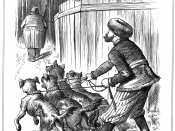Between 1400 and 1650, nobles and rulers reestablished
serfdom in the east (Bohemia, Silesia, Hungary, eastern Germany,
Poland Lithuania, and Russia). These countries gained economic
unity but serfs lost rights, and were bound to the land and
their lords. A runaway peasant was punished by having his ear
nailed to a tree and given a knife to cut it off. These land
lords could force peasants to work for up to 6 days without pay.
The reason for this was that new law codes set by weak kings to
comply with nobles gave them complete control over the serfs.
Though there were some peasant uprisings none had any effect, so
condistions didn't improve. The middle class was also
diminished greatly with the cutting of the middle man in foreign
trade.
In Austria and Prussia the Hapsburg king, Ferdinand II,
drastically reduced power of the Bohemian Estates. He had a
strong control over Bohemia and gave land from Protestant nobles
to Catholic nobles.
This gives him an advantage in that that
powerful nobles now owe him a great debt. Though generous to
the wealth he cared little about the fact that the peasants
worked at least 3 unpaid days a week and were under such harsh
treatment. Ferdinand III, his son, centralized the government
in the hereditary German-speaking provinces. For the first time
a permanent standing army was created there.
A new threat to all of Europe was also arising as the
Ottoman Turks came out of Anatolia (now Turkey) and under
Suleiman. They ruled the most powerful empire in the world
(from west Persia to North Africa to Central Europe), under him.
During this period all of Europe was in the grip of fear for no
one knew if they would try to expand into their regions.
Everyone/everything in the...


